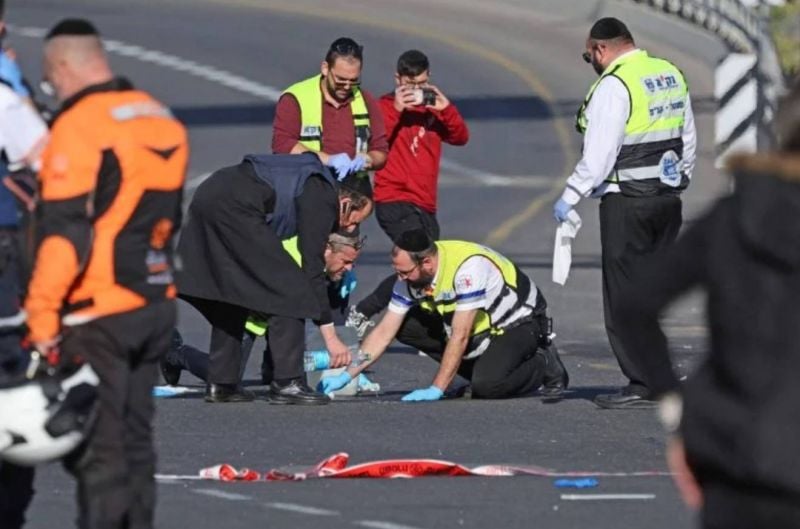
An Israeli rescue team inspects the scene of the shooting in Jerusalem, Nov. 30, 2023. (Credit: Ahmad Gharabli/AFP)
He would have turned 38 on Friday had Israeli security forces not ended his life. Israeli citizen Yuval Doron Castleman (also Kestelman) was shot after killing two Hamas militiamen carrying out an attack Thursday at a bus stop on the outskirts of Jerusalem during the humanitarian pause. Was Castleman's murder an error? No. It was a display of how little the Israeli armed forces value the lives of 'Arab terrorists,' suggested the Haaretz newspaper in an editorial. Castleman, the “hero,” was mistaken for a third Hamas assailant by law enforcement who arrived late to the scene.
Left on the ground
Castleman, a former policeman, had thrown his gun to the ground, raised his hands in the air, removed his jacket to show he had no explosive belt and pleaded in Hebrew to be spared. It was in vain. A young settler who was part of the troop shot Castleman multiple times in the abdomen in front of cameras and then turned away, according to Israeli journalist Dimi Reider. He was left on the ground bleeding, before succumbing to his injuries later that night, on his birthday. Meanwhile, the settler who murdered him gave interviews, boasted about his act, and received congratulations from the far-right.
So here's a story of our time.
— Dimi Reider | dimireider.substack.com (@reider) December 3, 2023
1. In 2016, an Israeli soldier called Elor Azaria executes a wounded Palestinian militant. Point blank. On camera.
2. He becomes a hero to the far-right and the execution of wounded suspects briefly became a wedge issue in Israeli society.
"Aviad Farija, the young reservist who executed Yuval Kestelman, has not been arrested nor has his weapon been confiscated. Apparently, having ties to a terrorist settler militia provides a certain level of immunity," denounced Benzion Sanders, the Jerusalem director of the organization Extend, which works with Israeli and Palestinian human rights defenders, on X (Twitter) Saturday night. After initially refusing to open a criminal investigation, citing the dubious pretext that it was an exchange of fire, Farija's weapons will be examined by a ballistic team, while he is expected to be questioned in the coming days.
Far-right sympathizers have since deleted the numerous publications elevating the settler to hero status. But the road seems long still since military rules dictate not to shoot a person who surrenders or no longer poses a threat. In a post on X Saturday night, Castleman’s uncle expressed his shock at why police did not immediately open an investigation for suspected murder.
Legacy of previous cases
This is not an isolated incident. “In recent years, there have been dozens, if not hundreds, of cases where security forces have executed Palestinian attackers who no longer posed a threat, with no consequences,” journalist Asaf Ronel posted on X. The first high-profile case dates back to 2016 when soldier Elor Azaria was filmed executing a Palestinian attacker who was already wounded and weaponless, after having stabbed an Israeli soldier in Hebron. Azaria, who would later be convicted of manslaughter less than a year later, with military judges citing a motive of vengeance, had in the meantime become a hero for the far-right. He was released just nine months after his initial 18-month sentence, which was later reduced to 14 months for "compassion and consideration for his combat service."
The episode had polarized Israeli society, which at the time faced a wave of Palestinian attacks on its territory. While human rights groups criticized the army for having a trigger-happy approach, some politicians emphasized that attackers should not emerge alive from such assaults. Benjamin Netanyahu, who was Prime Minister then as well, had notably called for Azaria's parole upon his conviction announcement, the New York Times reported at the time.
Today, the current Israeli Minister of National Security is none other than the ultra-nationalist Itamar Ben Gvir, who dressed up as Azaria during the religious holiday of Purim a few months after his conviction, to pay homage to him. The minister announced on Oct. 10, a few days after Hamas’ Al-Aqsa Flood, his intention to buy and distribute tens of thousands of weapons, helmets, and bulletproof vests to citizens involved in civil security groups. He also said he would facilitate the acquisition of gun permits: 25,000 authorizations have already been granted in less than two months. This decision was explicitly supported on Saturday by Netanyahu, who regained the prime minister position last December, leading the most right-wing government in the country's history. “We know that during waves of terrorism in the last decade, the presence of armed citizens can save the situation and prevent a major disaster... We might have to pay a price for this, that's life.”
Netanyahu's statement aims to maintain the support of his far-right coalition partners but could have adverse consequences. The pace of violence and murder committed by Israeli settlers in the occupied territories has accelerated since Oct. 7th, and the perpetrators seem to enjoy a degree of immunity. Western allies of Israel have since expressed outrage over this laissez-faire approach, recently calling for sanctions. Washington notably announced Friday that in the coming weeks, it would impose a visa ban on those engaged in “extremist violence” in the West Bank. It remains to be seen whether this will have a concrete influence on the perceptions of Israelis towards Palestinians.
This article was originally published in French in L'Orient-Le Jour.